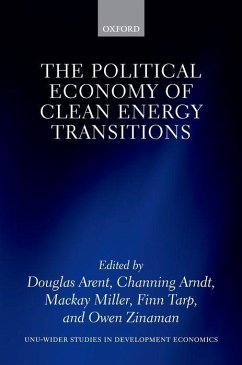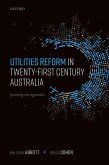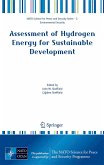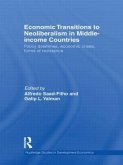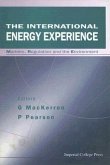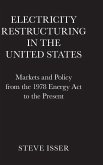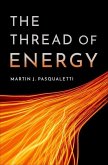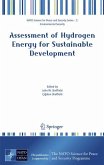The Political Economy of Clean Energy Transitions
Herausgeber: Arent, Douglas; Zinaman, Owen; Tarp, Finn; Miller, Mackay; Arndt, Channing
The Political Economy of Clean Energy Transitions
Herausgeber: Arent, Douglas; Zinaman, Owen; Tarp, Finn; Miller, Mackay; Arndt, Channing
- Gebundenes Buch
- Merkliste
- Auf die Merkliste
- Bewerten Bewerten
- Teilen
- Produkt teilen
- Produkterinnerung
- Produkterinnerung
A volume on the political economy of clean energy transition in developed and developing regions, with a focus on the issues that different countries face as they transition from fossil fuels to lower carbon technologies.
Andere Kunden interessierten sich auch für
![Utilities Reform in Twenty-First Century Australia Utilities Reform in Twenty-First Century Australia]() Malcolm AbbottUtilities Reform in Twenty-First Century Australia156,99 €
Malcolm AbbottUtilities Reform in Twenty-First Century Australia156,99 €![Assessment of Hydrogen Energy for Sustainable Development Assessment of Hydrogen Energy for Sustainable Development]() John W. Sheffield / Çigdem Sheffield (eds.)Assessment of Hydrogen Energy for Sustainable Development154,99 €
John W. Sheffield / Çigdem Sheffield (eds.)Assessment of Hydrogen Energy for Sustainable Development154,99 €![Economic Transitions to Neoliberalism in Middle-Income Countries Economic Transitions to Neoliberalism in Middle-Income Countries]() Economic Transitions to Neoliberalism in Middle-Income Countries142,99 €
Economic Transitions to Neoliberalism in Middle-Income Countries142,99 €![International Energy Experience, The: Markets, Regulation and the Environment International Energy Experience, The: Markets, Regulation and the Environment]() International Energy Experience, The: Markets, Regulation and the Environment146,99 €
International Energy Experience, The: Markets, Regulation and the Environment146,99 €![Electricity Restructuring in the United States Electricity Restructuring in the United States]() Steve IsserElectricity Restructuring in the United States92,99 €
Steve IsserElectricity Restructuring in the United States92,99 €![The Thread of Energy The Thread of Energy]() Martin J PasqualettiThe Thread of Energy144,99 €
Martin J PasqualettiThe Thread of Energy144,99 €![Assessment of Hydrogen Energy for Sustainable Development Assessment of Hydrogen Energy for Sustainable Development]() John W. Sheffield / Çigdem Sheffield (eds.)Assessment of Hydrogen Energy for Sustainable Development154,99 €
John W. Sheffield / Çigdem Sheffield (eds.)Assessment of Hydrogen Energy for Sustainable Development154,99 €-
-
-
A volume on the political economy of clean energy transition in developed and developing regions, with a focus on the issues that different countries face as they transition from fossil fuels to lower carbon technologies.
Hinweis: Dieser Artikel kann nur an eine deutsche Lieferadresse ausgeliefert werden.
Hinweis: Dieser Artikel kann nur an eine deutsche Lieferadresse ausgeliefert werden.
Produktdetails
- Produktdetails
- Verlag: Oxford University Press
- Seitenzahl: 632
- Erscheinungstermin: 13. Juni 2017
- Englisch
- Abmessung: 236mm x 165mm x 41mm
- Gewicht: 1039g
- ISBN-13: 9780198802242
- ISBN-10: 0198802242
- Artikelnr.: 47864715
- Herstellerkennzeichnung
- Libri GmbH
- Europaallee 1
- 36244 Bad Hersfeld
- gpsr@libri.de
- Verlag: Oxford University Press
- Seitenzahl: 632
- Erscheinungstermin: 13. Juni 2017
- Englisch
- Abmessung: 236mm x 165mm x 41mm
- Gewicht: 1039g
- ISBN-13: 9780198802242
- ISBN-10: 0198802242
- Artikelnr.: 47864715
- Herstellerkennzeichnung
- Libri GmbH
- Europaallee 1
- 36244 Bad Hersfeld
- gpsr@libri.de
Douglas Arent is Executive Director of JISEA. He is also a Senior Visiting Fellow at the Center for Strategic and International Studies and serves on the American Academy of Arts and Sciences Steering Committee on Social Science and the Alternative Energy Future. He is a member of the National Research Council Committee to advise the U.S. Global Change Research Program (USGCRP). He is also a member of the International Advisory Board for Energy Policy, an associate editor for Renewable and Sustainable Energy Reviews, on the Editorial Board of Sustainability, and the Editor in Chief of Renewable Energy Focus. Channing Arndt is a senior research fellow at United Nations University World Institute for Development Economics Research. He has substantial research management experience including leadership of interdisciplinary teams. His programme of research has focused on poverty alleviation and growth, agricultural development, market integration, gender and discrimination, the implications of the HIV/AIDS pandemic, technological change, trade policy, aid effectiveness, infrastructure investment, energy and biofuels, climate variability, and the economic implications of climate change. Mackay Miller is a Professional Scholar at JISEA/NREL. In addition to his JISEA research, Professor Miller is Lead Analyst for Technology & Strategy at National Grid. He previously worked at NREL, including an assignment at the U.S. Department of Energy. He has written widely in areas of renewable energy, smart grids, and regulatory dimensions of power system transformation. He is a member of the IEEE Power & Energy Society and serves on the Editorial Board for the IEEE Power & Energy Magazine. He holds an MBA from the University of Colorado, and a BA in International Relations from Brown University. Finn Tarp is Director of UNU-WIDER and Professor of Development Economics at the University of Copenhagen. He has some 38 years of experience in academic and applied development economics research, teaching and policy analysis. His field experience covers more than 20 years of in-country assignments in 35 countries across the developing world, including longer-term assignments in Swaziland, Mozambique, Zimbabwe, and Vietnam. Finn Tarp has published widely in leading international academic journals alongside a series of books, and he is a member of the World Bank Chief Economist's Council of Eminent Persons. Owen Zinaman is the Deputy Lead for the 21st Century Power Partnership (21CPP), a multilateral initiative of the Clean Energy Ministerial; he also manages the 21CPP South Africa in-country programme, and serves as a Power Sector Analyst at the National Renewable Energy Laboratory. He has published widely on power system transformation issues, including the grid integration of bulk and distributed renewable energy resources, power system flexibility, and policy and regulatory issues across the clean energy spectrum. He received his Master's degree in Nuclear Engineering and Radiological Sciences from the University of Michigan at Ann Arbor, with a focus on science and technology public policy.
* Part I. The Political Economy of Clean Energy Transitions
* 1: Douglas Arent, Channing Arndt, Mackay Miller, Finn Tarp, and Owen
Zinaman: Introduction and Synthesis
* 2: Benjamin K. Sovacool: The history and politics of energy
transitions: Comparing contested views and finding common ground
* Part II. Climate Policy
* 3: Jesse D. Jenkins and Valerie J. Karplus: Carbon pricing under
political Constraints: insights for accelerating clean energy
transitions
* 4: Julien Bueb, Lilian Richieri Hanania, and Alice Le Clézio: Border
adjustment mechanisms: Elements for economic, legal, and political
analysis
* 5: Erik Gawel, Sebastian Strunz, and Paul Lehmann: Support policies
for renewables: Instrument choice and instrument change from a public
choice perspective
* Part III. Institutions and Governance
* 6: Stefan Cetkovic, Aron Buzogány, and Miranda Schreurs: Varieties of
clean energy transitions in Europe: Political-economic foundations of
onshore and offshore wind development
* 7: Shouro Dasgupta, Enrica De Cian, and Elena Verdolini: The
political economy of energy innovation
* 8: Dewi Yuliani: Is feed-in-tariff policy effective for increasing
deployment of renewable energy in Indonesia?
* 9: Éric Nazindigouba Kere: Do political economy factors matter in
explaining the increase in the production of bioenergy?
* 10: Jonas Sonnenschein: Understanding indicator choice for the
assessment of RDandD financing of low-carbon energy technologies:
Lessons from the Nordic countries
* 11: David Onyinyechi Agu and Evelyn Nwamaka Ogbeide-Osaretin: An
inquiry into the political economy of the global clean energy
transition policies and Nigeria's federal and state governments'
fiscal policies
* Part IV. Actors and Interests
* 12: Karoliina Isoaho, Alexandra Goritz, and Nicolai Schulz: Governing
clean energy transitions in China and India
* 13: Michael R. Davidson, Fredrich Kahrl, and Valerie J. Karplus:
Towards a political economy framework for wind power: Does China
break the mould?
* 14: Britta Rennkamp and Radhika Bhuyan: The social shaping of nuclear
energy technology in South Africa
* 15: Almas Heshmati and Shahrouz Abolhosseini: European energy
security: challenges and green opportunities
* Part V. Incumbency
* 16: Ross Astoria: Incumbancy and the legal configuration of
hydrocarbon infrastructure
* 17: Cherrelle Eid, Rudi Hakvoort, Martin de Jong: Global trends in
the political economy of smart grids
* 18: Henok Birhanu Asmelash: Falling oil prices and sustainable energy
transition: Towards a multilateral agreement on fossil-fuel subsidies
* Part VI. Sector Reform
* 19: Lucy Baker: Post-apartheid electricity policy and the emergence
of South Africa's renewable energy sector
* 20: Eric Kehinde Ogunleye: Political economy of Nigerian power sector
reform
* 21: José María Valenzuela and Isabel Studer: Climate change policy
and power sector reform in Mexico under the golden age of gas
* 22: Santiago Bucaram, Mario Andrés Fernández, and Diego Grijalva:
Sell the oil deposits! A financial proposal to keep the oil
underground in the Yasuni National Park, Ecuador
* Part VII. Social Inclusion
* 23: Chika Ezeanya and Abel Kennedy: Integrating clean energy use in
national poverty reduction strategies: Opportunities and challenges
in Rwanda's Girinka programme
* 24: Sabrina McCormick: Renewable energy in the Brazilian Amazon: the
drivers of political economy and climate
* 25: Wikus Kruger, Louise Tait, and Jiska de Groot: The political
economy of household thermal energy choices in developing countries:
comparing the LPG sectors in Indonesia and South Africa
* Part VIII. Regional Dynamics
* 26: Kim Hang Pham Do and Ariel Dinar: The linkages of energy, water,
and land use in Southeast Asia: Challenges and opportunities for the
Mekong region
* 27: Jose A. Puppim de Oliveira and Celio Andrade: The political
economy of clean energy transitions at sub-national level:
Understanding the role of international climate regimes in energy
policy in two Brazilian states
* 28: Gilles Lepesant: Implementing EU renewable energy policy at the
subnational level: navigating between conflicting interests
* Part IX. Moving Forward
* 29: Douglas Arent, Channing Arndt, Mackay Miller, Finn Tarp, and Owen
Zinaman: Moving forward
* 1: Douglas Arent, Channing Arndt, Mackay Miller, Finn Tarp, and Owen
Zinaman: Introduction and Synthesis
* 2: Benjamin K. Sovacool: The history and politics of energy
transitions: Comparing contested views and finding common ground
* Part II. Climate Policy
* 3: Jesse D. Jenkins and Valerie J. Karplus: Carbon pricing under
political Constraints: insights for accelerating clean energy
transitions
* 4: Julien Bueb, Lilian Richieri Hanania, and Alice Le Clézio: Border
adjustment mechanisms: Elements for economic, legal, and political
analysis
* 5: Erik Gawel, Sebastian Strunz, and Paul Lehmann: Support policies
for renewables: Instrument choice and instrument change from a public
choice perspective
* Part III. Institutions and Governance
* 6: Stefan Cetkovic, Aron Buzogány, and Miranda Schreurs: Varieties of
clean energy transitions in Europe: Political-economic foundations of
onshore and offshore wind development
* 7: Shouro Dasgupta, Enrica De Cian, and Elena Verdolini: The
political economy of energy innovation
* 8: Dewi Yuliani: Is feed-in-tariff policy effective for increasing
deployment of renewable energy in Indonesia?
* 9: Éric Nazindigouba Kere: Do political economy factors matter in
explaining the increase in the production of bioenergy?
* 10: Jonas Sonnenschein: Understanding indicator choice for the
assessment of RDandD financing of low-carbon energy technologies:
Lessons from the Nordic countries
* 11: David Onyinyechi Agu and Evelyn Nwamaka Ogbeide-Osaretin: An
inquiry into the political economy of the global clean energy
transition policies and Nigeria's federal and state governments'
fiscal policies
* Part IV. Actors and Interests
* 12: Karoliina Isoaho, Alexandra Goritz, and Nicolai Schulz: Governing
clean energy transitions in China and India
* 13: Michael R. Davidson, Fredrich Kahrl, and Valerie J. Karplus:
Towards a political economy framework for wind power: Does China
break the mould?
* 14: Britta Rennkamp and Radhika Bhuyan: The social shaping of nuclear
energy technology in South Africa
* 15: Almas Heshmati and Shahrouz Abolhosseini: European energy
security: challenges and green opportunities
* Part V. Incumbency
* 16: Ross Astoria: Incumbancy and the legal configuration of
hydrocarbon infrastructure
* 17: Cherrelle Eid, Rudi Hakvoort, Martin de Jong: Global trends in
the political economy of smart grids
* 18: Henok Birhanu Asmelash: Falling oil prices and sustainable energy
transition: Towards a multilateral agreement on fossil-fuel subsidies
* Part VI. Sector Reform
* 19: Lucy Baker: Post-apartheid electricity policy and the emergence
of South Africa's renewable energy sector
* 20: Eric Kehinde Ogunleye: Political economy of Nigerian power sector
reform
* 21: José María Valenzuela and Isabel Studer: Climate change policy
and power sector reform in Mexico under the golden age of gas
* 22: Santiago Bucaram, Mario Andrés Fernández, and Diego Grijalva:
Sell the oil deposits! A financial proposal to keep the oil
underground in the Yasuni National Park, Ecuador
* Part VII. Social Inclusion
* 23: Chika Ezeanya and Abel Kennedy: Integrating clean energy use in
national poverty reduction strategies: Opportunities and challenges
in Rwanda's Girinka programme
* 24: Sabrina McCormick: Renewable energy in the Brazilian Amazon: the
drivers of political economy and climate
* 25: Wikus Kruger, Louise Tait, and Jiska de Groot: The political
economy of household thermal energy choices in developing countries:
comparing the LPG sectors in Indonesia and South Africa
* Part VIII. Regional Dynamics
* 26: Kim Hang Pham Do and Ariel Dinar: The linkages of energy, water,
and land use in Southeast Asia: Challenges and opportunities for the
Mekong region
* 27: Jose A. Puppim de Oliveira and Celio Andrade: The political
economy of clean energy transitions at sub-national level:
Understanding the role of international climate regimes in energy
policy in two Brazilian states
* 28: Gilles Lepesant: Implementing EU renewable energy policy at the
subnational level: navigating between conflicting interests
* Part IX. Moving Forward
* 29: Douglas Arent, Channing Arndt, Mackay Miller, Finn Tarp, and Owen
Zinaman: Moving forward
* Part I. The Political Economy of Clean Energy Transitions
* 1: Douglas Arent, Channing Arndt, Mackay Miller, Finn Tarp, and Owen
Zinaman: Introduction and Synthesis
* 2: Benjamin K. Sovacool: The history and politics of energy
transitions: Comparing contested views and finding common ground
* Part II. Climate Policy
* 3: Jesse D. Jenkins and Valerie J. Karplus: Carbon pricing under
political Constraints: insights for accelerating clean energy
transitions
* 4: Julien Bueb, Lilian Richieri Hanania, and Alice Le Clézio: Border
adjustment mechanisms: Elements for economic, legal, and political
analysis
* 5: Erik Gawel, Sebastian Strunz, and Paul Lehmann: Support policies
for renewables: Instrument choice and instrument change from a public
choice perspective
* Part III. Institutions and Governance
* 6: Stefan Cetkovic, Aron Buzogány, and Miranda Schreurs: Varieties of
clean energy transitions in Europe: Political-economic foundations of
onshore and offshore wind development
* 7: Shouro Dasgupta, Enrica De Cian, and Elena Verdolini: The
political economy of energy innovation
* 8: Dewi Yuliani: Is feed-in-tariff policy effective for increasing
deployment of renewable energy in Indonesia?
* 9: Éric Nazindigouba Kere: Do political economy factors matter in
explaining the increase in the production of bioenergy?
* 10: Jonas Sonnenschein: Understanding indicator choice for the
assessment of RDandD financing of low-carbon energy technologies:
Lessons from the Nordic countries
* 11: David Onyinyechi Agu and Evelyn Nwamaka Ogbeide-Osaretin: An
inquiry into the political economy of the global clean energy
transition policies and Nigeria's federal and state governments'
fiscal policies
* Part IV. Actors and Interests
* 12: Karoliina Isoaho, Alexandra Goritz, and Nicolai Schulz: Governing
clean energy transitions in China and India
* 13: Michael R. Davidson, Fredrich Kahrl, and Valerie J. Karplus:
Towards a political economy framework for wind power: Does China
break the mould?
* 14: Britta Rennkamp and Radhika Bhuyan: The social shaping of nuclear
energy technology in South Africa
* 15: Almas Heshmati and Shahrouz Abolhosseini: European energy
security: challenges and green opportunities
* Part V. Incumbency
* 16: Ross Astoria: Incumbancy and the legal configuration of
hydrocarbon infrastructure
* 17: Cherrelle Eid, Rudi Hakvoort, Martin de Jong: Global trends in
the political economy of smart grids
* 18: Henok Birhanu Asmelash: Falling oil prices and sustainable energy
transition: Towards a multilateral agreement on fossil-fuel subsidies
* Part VI. Sector Reform
* 19: Lucy Baker: Post-apartheid electricity policy and the emergence
of South Africa's renewable energy sector
* 20: Eric Kehinde Ogunleye: Political economy of Nigerian power sector
reform
* 21: José María Valenzuela and Isabel Studer: Climate change policy
and power sector reform in Mexico under the golden age of gas
* 22: Santiago Bucaram, Mario Andrés Fernández, and Diego Grijalva:
Sell the oil deposits! A financial proposal to keep the oil
underground in the Yasuni National Park, Ecuador
* Part VII. Social Inclusion
* 23: Chika Ezeanya and Abel Kennedy: Integrating clean energy use in
national poverty reduction strategies: Opportunities and challenges
in Rwanda's Girinka programme
* 24: Sabrina McCormick: Renewable energy in the Brazilian Amazon: the
drivers of political economy and climate
* 25: Wikus Kruger, Louise Tait, and Jiska de Groot: The political
economy of household thermal energy choices in developing countries:
comparing the LPG sectors in Indonesia and South Africa
* Part VIII. Regional Dynamics
* 26: Kim Hang Pham Do and Ariel Dinar: The linkages of energy, water,
and land use in Southeast Asia: Challenges and opportunities for the
Mekong region
* 27: Jose A. Puppim de Oliveira and Celio Andrade: The political
economy of clean energy transitions at sub-national level:
Understanding the role of international climate regimes in energy
policy in two Brazilian states
* 28: Gilles Lepesant: Implementing EU renewable energy policy at the
subnational level: navigating between conflicting interests
* Part IX. Moving Forward
* 29: Douglas Arent, Channing Arndt, Mackay Miller, Finn Tarp, and Owen
Zinaman: Moving forward
* 1: Douglas Arent, Channing Arndt, Mackay Miller, Finn Tarp, and Owen
Zinaman: Introduction and Synthesis
* 2: Benjamin K. Sovacool: The history and politics of energy
transitions: Comparing contested views and finding common ground
* Part II. Climate Policy
* 3: Jesse D. Jenkins and Valerie J. Karplus: Carbon pricing under
political Constraints: insights for accelerating clean energy
transitions
* 4: Julien Bueb, Lilian Richieri Hanania, and Alice Le Clézio: Border
adjustment mechanisms: Elements for economic, legal, and political
analysis
* 5: Erik Gawel, Sebastian Strunz, and Paul Lehmann: Support policies
for renewables: Instrument choice and instrument change from a public
choice perspective
* Part III. Institutions and Governance
* 6: Stefan Cetkovic, Aron Buzogány, and Miranda Schreurs: Varieties of
clean energy transitions in Europe: Political-economic foundations of
onshore and offshore wind development
* 7: Shouro Dasgupta, Enrica De Cian, and Elena Verdolini: The
political economy of energy innovation
* 8: Dewi Yuliani: Is feed-in-tariff policy effective for increasing
deployment of renewable energy in Indonesia?
* 9: Éric Nazindigouba Kere: Do political economy factors matter in
explaining the increase in the production of bioenergy?
* 10: Jonas Sonnenschein: Understanding indicator choice for the
assessment of RDandD financing of low-carbon energy technologies:
Lessons from the Nordic countries
* 11: David Onyinyechi Agu and Evelyn Nwamaka Ogbeide-Osaretin: An
inquiry into the political economy of the global clean energy
transition policies and Nigeria's federal and state governments'
fiscal policies
* Part IV. Actors and Interests
* 12: Karoliina Isoaho, Alexandra Goritz, and Nicolai Schulz: Governing
clean energy transitions in China and India
* 13: Michael R. Davidson, Fredrich Kahrl, and Valerie J. Karplus:
Towards a political economy framework for wind power: Does China
break the mould?
* 14: Britta Rennkamp and Radhika Bhuyan: The social shaping of nuclear
energy technology in South Africa
* 15: Almas Heshmati and Shahrouz Abolhosseini: European energy
security: challenges and green opportunities
* Part V. Incumbency
* 16: Ross Astoria: Incumbancy and the legal configuration of
hydrocarbon infrastructure
* 17: Cherrelle Eid, Rudi Hakvoort, Martin de Jong: Global trends in
the political economy of smart grids
* 18: Henok Birhanu Asmelash: Falling oil prices and sustainable energy
transition: Towards a multilateral agreement on fossil-fuel subsidies
* Part VI. Sector Reform
* 19: Lucy Baker: Post-apartheid electricity policy and the emergence
of South Africa's renewable energy sector
* 20: Eric Kehinde Ogunleye: Political economy of Nigerian power sector
reform
* 21: José María Valenzuela and Isabel Studer: Climate change policy
and power sector reform in Mexico under the golden age of gas
* 22: Santiago Bucaram, Mario Andrés Fernández, and Diego Grijalva:
Sell the oil deposits! A financial proposal to keep the oil
underground in the Yasuni National Park, Ecuador
* Part VII. Social Inclusion
* 23: Chika Ezeanya and Abel Kennedy: Integrating clean energy use in
national poverty reduction strategies: Opportunities and challenges
in Rwanda's Girinka programme
* 24: Sabrina McCormick: Renewable energy in the Brazilian Amazon: the
drivers of political economy and climate
* 25: Wikus Kruger, Louise Tait, and Jiska de Groot: The political
economy of household thermal energy choices in developing countries:
comparing the LPG sectors in Indonesia and South Africa
* Part VIII. Regional Dynamics
* 26: Kim Hang Pham Do and Ariel Dinar: The linkages of energy, water,
and land use in Southeast Asia: Challenges and opportunities for the
Mekong region
* 27: Jose A. Puppim de Oliveira and Celio Andrade: The political
economy of clean energy transitions at sub-national level:
Understanding the role of international climate regimes in energy
policy in two Brazilian states
* 28: Gilles Lepesant: Implementing EU renewable energy policy at the
subnational level: navigating between conflicting interests
* Part IX. Moving Forward
* 29: Douglas Arent, Channing Arndt, Mackay Miller, Finn Tarp, and Owen
Zinaman: Moving forward

